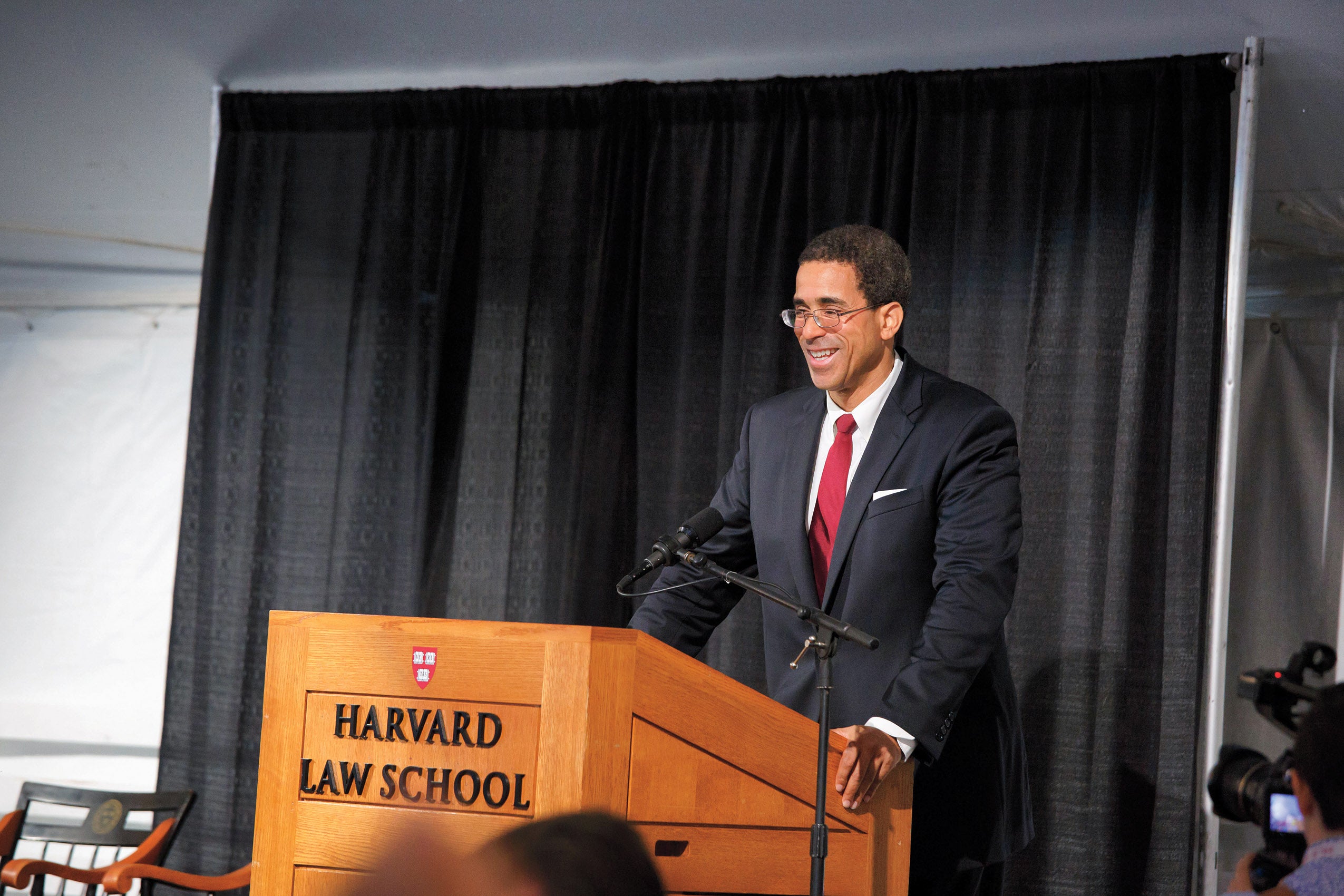“I have to tell you, honestly—and this will sound cheesy but it’s true—my years at Harvard Law School were among the three happiest of my life,” says Dan Eaton ’89, the 2018-2020 president of the Harvard Law School Association, which unites more than 40,000 HLS alumni and students around the globe. “Not only was I inspired by the brilliance of the professors but also by the brilliant and very diverse voices I heard both in the classroom and outside the classroom from my fellow students.”
“There isn’t a day, not a day, that I don’t draw on the lessons from my three years of law school.”
Soon after he arrived on campus, Eaton recognized that HLS would be a remarkable experience. He recalls that as a 1L, before classes began, he and other African-American students discussed a U.S. Supreme Court case with the guidance of several 2Ls (one of them was Michelle Robinson ’88, future first lady, and the other, Jocelyn Frye ’88, her future policy adviser), and they engaged in further discussion of the case with Professor Charles Ogletree ’78, renowned criminal law expert. The same week, two Supreme Court justices, William J. Brennan Jr. ’31 and Harry Blackmun ’32, were on campus for an alumni event, taking questions from students.
“I remember thinking, Wow, welcome to Harvard Law School!” recalls Eaton, a partner with San Diego’s Seltzer Caplan McMahon Vitek, where he focuses on employment law defense. “Not to say there weren’t challenges, of course. There were, but they were the kinds of challenges that make you grow, and I’ve continued to grow from that experience ever since.”
Eaton says his experience at HLS leads him to pay it forward in a variety of ways including as HLSA president, and, in 2016, as a program co-chair of the fourth Celebration of Black Alumni, when, he says, “I welcomed the opportunity to go back and engage with amazing, accomplished African-Americans who are fellow alums, people like Loretta Lynch and Ted Wells, Professor Ogletree and Ken Frazier and Ken Chenault. My political view is a little different from most African-Americans’—I’m a conservative—but there was a willingness to engage in deep discussion.”
As HLSA president, he is focused on developing “durable means of communication among alums,” he says. “That means both where local clubs feel empowered and supported to provide opportunities for alums to meet, and online communications mechanisms so alums can reach out to each other as resources.”
Born in Queens, New York, Eaton grew up in Mount Vernon, New York. As a student at Georgetown University and after graduation, he worked as an aide to U.S. Sen. Arlen Specter, where his focus included labor issues. That led to his interest in employment and labor law. “It’s very people-focused,” explains Eaton, who was drawn to advising and litigating on behalf of businesses “so they can make the right decisions as both a legal matter and an ethical matter.”
After graduating from HLS, he chose San Diego not only for the weather, “but because it was a place that was open to meaningful contributions from outsiders, where I could take part and pitch in as an expression of my patriotism, at a very high level.” Before age 30, he’d been elected president of the Earl B. Gilliam Bar Association, the local organization of African-American lawyers. During the second trial of the police officers accused in the beating of Rodney King, Eaton provided legal commentary on local radio and TV, a role he continues today. He appears regularly on the local NPR affiliate, where he discusses a wide range of legal issues and the U.S. Supreme Court. He also writes a column on employment law for The San Diego Union-Tribune.
Legal ethics is another interest. He is on the disciplinary committee of the local federal court, and for the past three years he has served on the California State Bar’s rules revision commission, which recommended the first overhaul in 30 years of the rules of professional conduct. The California Supreme Court substantially adopted the new rules; among other changes, they make it easier to discipline lawyers who engage in discriminatory behavior.
“There isn’t a day, not a day, that I don’t draw on the lessons from my three years of law school,” Eaton says.
To learn more about events in your area, go to: alumni.law.harvard.edu.
